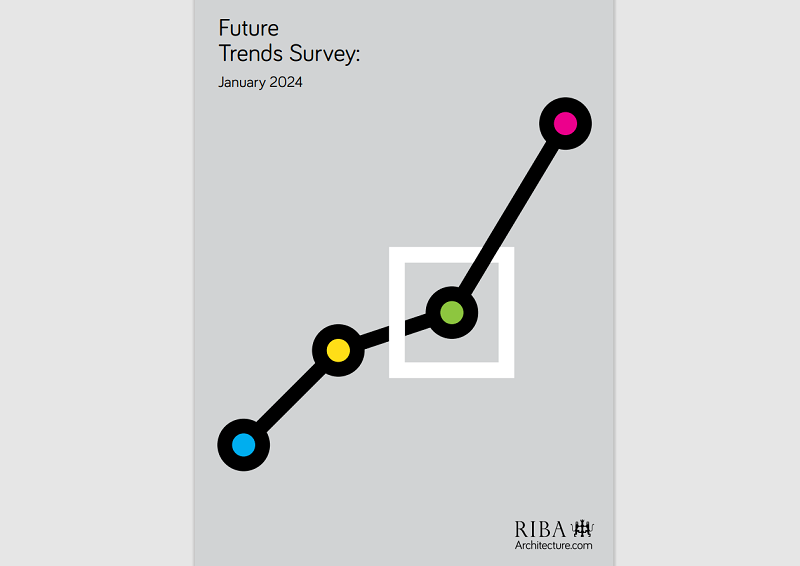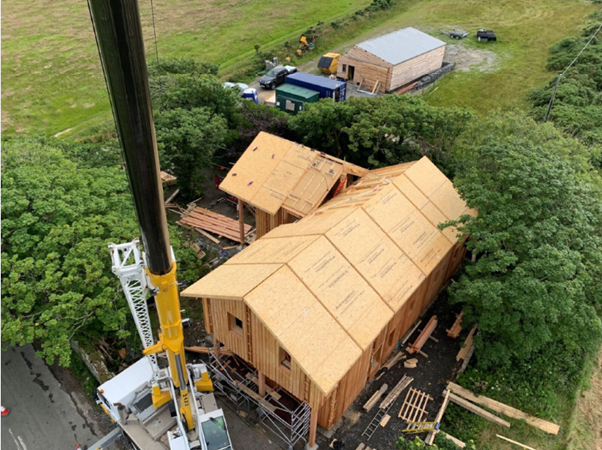The Royal Institute of British Architects (RIBA) has published the findings from its latest Future Trends Survey, a monthly report of business and employment trends affecting the architects’ profession.
January’s findings show that over the next three months architects continue to expect workloads and staffing levels to fall overall, reporting ongoing challenges including planning system delays.
In January, the RIBA Future Trends Workload Index rose by 1 point to -8. This marked the seventh consecutive month of negative figures, the longest run since RIBA Future Trends began in 2009.
Over the next three months, 18% of practices expect workloads to increase, 26% expect them to decrease, and 52% expect them to stay the same.
The outlook of small practices (1-10 staff) improved slightly, rising by 5 points to -10, while the outlook of medium (11+ staff) and large (50+ staff) practices fell by 27 points to a combined figure of +3.

All monitored work sectors retained a negative outlook on future work, although none worsened. The outlook for the Private Housing sector improved by 4 points to -12, the Commercial (-5) and Public (-9) sectors held steady, and the Community sector rose by 1 point to -8.
Regionally, the picture remained mixed. London’s outlook dipped into positive territory (+1) after three months of pessimism; the North of England (+2) remained positive; Wales & the West (-16) and the Midlands & East Anglia (-20) remained negative; while the South of England’s outlook (-21) deteriorated by 7 points.
In January, the RIBA Future Trends Permanent Staffing Index held steady at -2, indicating that practices expect their permanent staff numbers to decrease.
- Over the next three months, 8% of practices expect to employ more permanent staff, 10% expect to employ fewer, and 83% expect no change.
- Small practices continued to expect staffing levels to decline, returning a Permanent Staffing Index figure of -4, a 1-point improvement from last month.
- Medium and large practices still expected staffing levels to increase, returning a combined Permanent Staffing Index figure of +8, although this is an 11-point fall from last month.
- The regional outlook on permanent staffing remained varied. Wales & the West, with a Staffing Index figure of +10, is the only region where practices expected an increase in permanent staffing levels.
- The Temporary Staffing Index held steady at -6, suggesting falling numbers of temporary staff over the next three months.
- Levels of personal underemployment increased from 26% in December to 29% in January.
RIBA Head of Economic Research and Analysis Adrian Malleson said: “Amid raised interest rates and a weak UK economy, for the seventh consecutive month, architects expect workloads to fall – the longest period of pessimism since the survey began in 2009.
“Persistently above-target inflation, and difficulties for clients obtaining finance, continue to weigh on workloads, while the poor performance of the housing sector continues to impact smaller practices.
“These issues are exacerbated by ongoing planning delays. Many practices stress failures in the planning system, which are delaying project progress, diminishing practice revenue, and holding back the UK's economic prosperity. Practices also report downward pressure on fees, with a number reporting domestic clients seeking free early-stage design and planning advice.
“As the profession grapples with these challenges, RIBA is here to provide practical tools and resources to help practices succeed - from navigating professional indemnity insurance, to calculating fees, to writing contracts.
“If the Consumer Price Index (CPI) inflation remains on a downward trend, we can hope to see the construction output price inflation to fall. While the outlook for 2024 remains uncertain, the hope of falling interest rates and an economy emerging from recession provide some grounds for optimism.
“We will continue to report our findings to the Government and work with other built environment bodies to monitor these trends.”




















